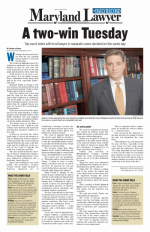
By Danielle E. Gaines News-Post Staff
The Frederick County Sheriff’s Office did not comply with state notification laws after a courthouse deputy’s family member was reported shot to death in their home.
In response to a Public Information Act request from The Frederick News-Post, State’s Attorney Charlie Smith said his office became aware of the death, which occurred early Feb. 27, that afternoon through “collateral sources.”
Maryland law requires the police or sheriff to immediately notify the medical examiner and state’s attorney when a death occurs by violence, suicide, casualty, suddenly, or in any suspicious or unusual manner. The law enforcement agency is required to give the known facts concerning the time, place, manner and circumstances of the death, according to the law.
The law does not outline any penalties for failure to make a notification.
Smith said his office contacted the sheriff’s office the day it learned of the death. On the morning of the next workday, Detective Jason West telephoned Assistant State’s Attorney Kirsten Brown, chief of the office’s violent crimes division.
Smith said there is no official documentation of the communication because it was over the phone.
Smith said it’s not uncommon for someone in his office to respond to a death, because if the case goes to trial, it’s helpful for prosecutors to have some awareness of the scene, he said.
But his office often doesn’t respond to the scene of a suicide report, Smith said.
“That would depend upon how the case was reported to us,” he said.
Sheriff Chuck Jenkins said Friday he didn’t know why the notification wasn’t initially made.
“We’ve addressed that internally,” Jenkins said. “I can assure you that won’t happen again in the future.”
A number of first responders reported to the courthouse deputy’s home for the report of a self-inflicted gunshot wound just before 3:30 a.m. Feb. 27, according to scanner communications obtained by The News-Post.
The man is a non-sworn civilian courthouse deputy who was hired by the sheriff’s office less than two years ago, Jenkins said. His service weapon was used in the shooting.
The family member later died at Frederick Memorial Hospital, according to an obituary submitted by the family.
An investigator from the Office of the Chief Medical Examiner was notified shortly after deputies were called and went to the house, Jenkins previously told The News-Post.
The medical examiner or investigator is required to take possession of and deliver to the state’s attorney or his designee any object or article that could be useful in establishing the cause of death.
An autopsy report showed the cause of death was two gunshot wounds.
Lawyer Andrew V. Jezic has been hired by family members of the deceased to assist them during the investigation.
“I’ve been hired to interview witnesses and to look carefully at all the evidence the state is willing to give me. I am grateful to Charlie Smith for taking into consideration the report that we have sent,” Jezic said in a phone interview. “I am also grateful to the sheriff’s office’s willingness to reach out to the family of the deceased to share as much information as is legally permitted.”
Two investigations related to the case are ongoing: a criminal investigation and an internal affairs investigation.
“As a citizen, I’m concerned that a courthouse deputy allegedly kept two unlocked, loaded handguns, one of which was his service revolver, in a home with a 3-year-old,” Jezic said.
It is a misdemeanor in Maryland to keep a loaded gun that could be accessed by a child under the age of 16.
The Maryland Police and Correctional Training Commissions, the organization that certifies police officers and police agencies in the state, trains officers to always keep their service weapons unloaded while at home, with the ammunition stored separately. Secondary security devices, such as a safe or lock, are also recommended, a firearms instructor told The News-Post in March.
Smith said his office was in possession of some but not all documents created by the sheriff’s office relating to the investigation. No documents had been created by his office, Smith said in a written response to the request for information. None of the documents would be subject to disclosure under state public information laws because of the ongoing investigation, he added.
The Frederick News-Post has also requested copies of reports and recordings from the sheriff’s office.






